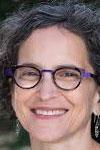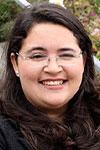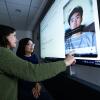
Faculty, students and School leadership collaborated to expand students’ understanding of structural racism’s impact on health, resulting in the course, "Racism, Health Care and Social Justice" becoming a required class for all master's students.
Preparing Nurses to Address Structural Racism’s Impact on Health
The UCSF School of Nursing is preparing nurses to become leaders in health equity by incorporating new requirements into its curriculum that expand students’ understanding of structural racism’s impact on health.
Starting this academic year, all students within the School’s Master of Science Program are required to complete the course “Racism, Health Care and Social Justice.”
The curriculum enhancement underscores the School’s commitment to address health inequities and offer practical approaches that students can apply to combat racism’s effects in health care.
“It’s important that every nurse who earns a graduate degree study these concepts and the many ways they impact health care,” said Lisa Mihaly, an associate professor who helped  Lisa Mihaly develop and co-instructs the course.
Lisa Mihaly develop and co-instructs the course.
The new course builds on academic content that focused on the health care of underrepresented populations. For example, past courses such as “Care for Vulnerable Populations” in the Family Nurse Practitioner specialty and “Racism and Health Disparity Prevention” in the Nurse Midwifery/Women’s Health Nurse Practitioner specialty had been offered at the School for years.
“Racism, Health Care and Social Justice” applies a broad structural lens, accounting for racism’s historical role in influencing present-day health inequities. It examines the institutions, ideologies and processes that interact with one another to generate and reinforce inequities among racial and ethnic groups. It explores racism and health care in the context of environmental justice, homelessness, xenophobia and reproductive justice, among other topics.
“It Was a Collaborative Effort”
The course grew out of the School’s ongoing examination of its programs to ensure its curriculum meets current health needs. Recently, after launching a task force to examine studies and consult with faculty, students and an external expert, the School modernized its socio-cultural graduation requirement to emphasize structural competency, which encourages health care professionals to recognize, analyze and intervene upon the structural factors that impact health disparities.
“Racism, Health Care and Social Justice” focuses on structural racism and determinants of health and aligns with this graduation requirement. It was developed by Mihaly and assistant professor Jayme Mejia, in consultation with associate professor Kim Dau, assistant professor Ifeyinwa Asiodu and students.
Piloted within the Family Nurse Practitioner specialty last year, the course resonated with students, said alumna Denisse Porter (MS ’19). When students in other specialties learned of the course’s content, they advocated for these topics to be included in their specialties as well.
 Denisse Porter “Understanding how racism and oppression affect the health of communities that experience marginalization is why we came to UCSF and why we went into nursing,” said Porter, who cares for individuals affected by marginal conditions and structural racism as the Clinical Lead of Women’s Clinic at Mission Neighborhood Health Center in San Francisco. “Caring for people in under-resourced settings and addressing inequities is a passion for us. We felt that issues of racism and health care needed to be taught to all students.”
Denisse Porter “Understanding how racism and oppression affect the health of communities that experience marginalization is why we came to UCSF and why we went into nursing,” said Porter, who cares for individuals affected by marginal conditions and structural racism as the Clinical Lead of Women’s Clinic at Mission Neighborhood Health Center in San Francisco. “Caring for people in under-resourced settings and addressing inequities is a passion for us. We felt that issues of racism and health care needed to be taught to all students.”
The School’s leadership and faculty embraced the concept and incorporated the course into the Master of Science program’s core curriculum, which is required of all students.
“It was a collaborative effort,” said Porter about working with faculty to enhance the curriculum. “A lot of the students that advocated for this are first-generation, people of color and from marginalized communities. We came from these communities and many of us are going back to serve these communities. As the future of nursing, it’s important to critically think and take action towards addressing inequities that affect people’s health.”
A Model for Other Nursing Schools
The course’s early success has reached nursing schools across the country. Mihaly has received inquiries from educators at peer institutions who hope to create similar courses to train their students about the impact of structural racism on health care.
“Our students have pushed the School to take a more systemic approach and look at structural factors,” Mihaly said. “Exploring these system-level topics can be difficult and painful,  Linda Stephan but they are important — here and around the country.”
Linda Stephan but they are important — here and around the country.”
“I feel proud to be at an institution that is making this a priority. UCSF can lead in this regard,” said Linda Stephan, who chairs the School’s Master’s Program Council.



